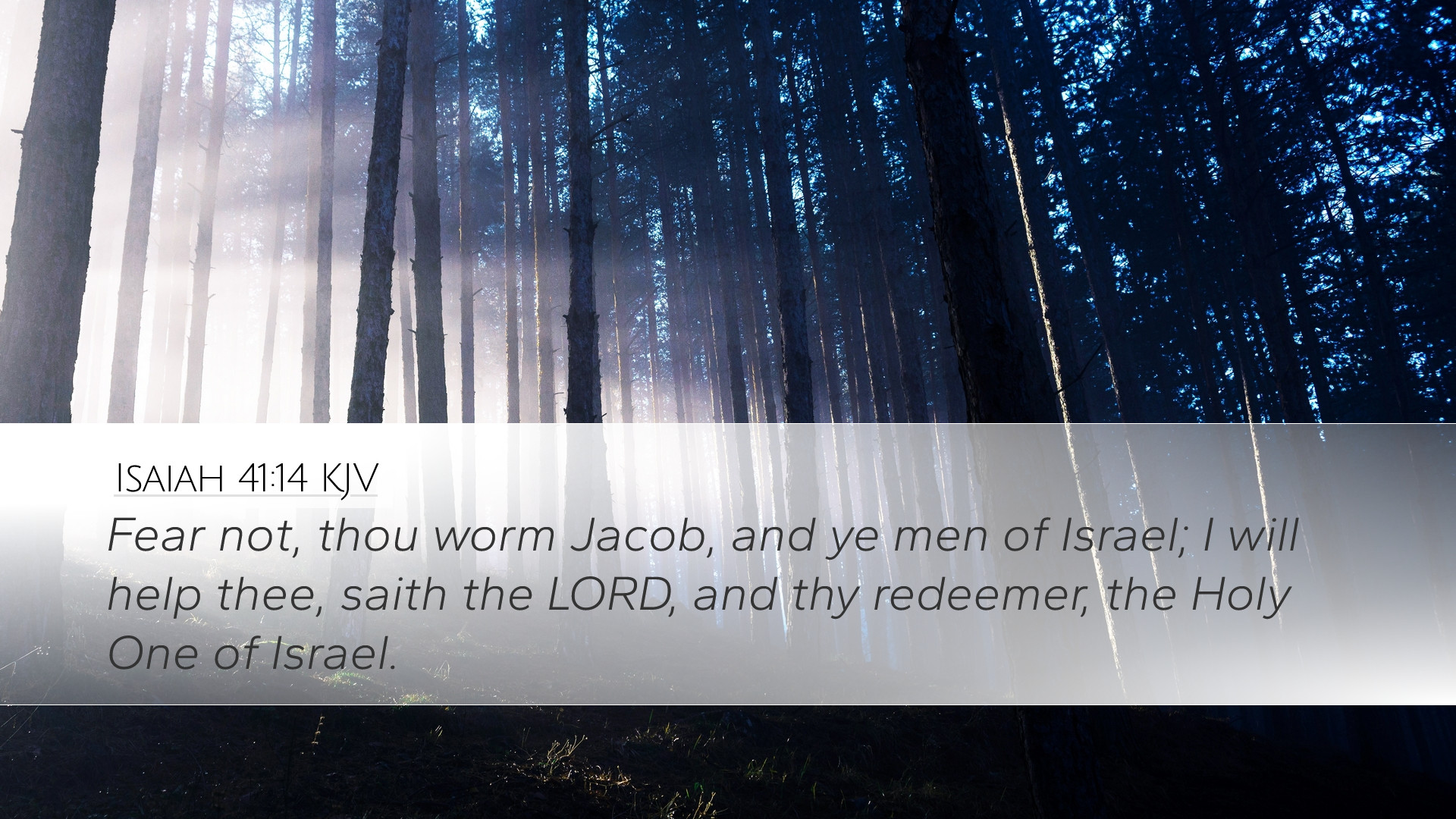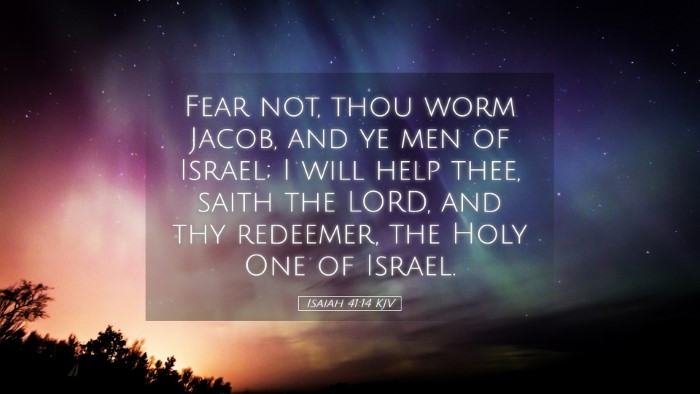Commentary on Isaiah 41:14
Verse: "Fear not, thou worm Jacob, and ye men of Israel; I will help thee, saith the Lord, and thy redeemer, the Holy One of Israel." (Isaiah 41:14)
Introduction
The prophetic book of Isaiah contains profound messages that resonate with God’s covenant relationship with Israel. Isaiah 41:14 stands as a beacon of hope and reassurance, particularly for the oppressed and vulnerable. This verse speaks directly to Jacob, a metaphorical representation of Israel, using imagery that communicates both humility and divine assistance. The following commentary synthesizes insights from esteemed public domain authors Matthew Henry, Albert Barnes, and Adam Clarke.
Contextual Analysis
Isaiah was a prophet who ministered during a tumultuous period for the nation of Israel. The Israelites faced threats from various nations, and their allegiance to God was often called into question. In this context, Isaiah 41 addresses God’s commitment to affirming and rescuing His people. The term "worm" signifies a lowly state, emphasizing the humility and weakness of Israel, yet alongside it is the promise of divine help and deliverance.
Verse Breakdown
- "Fear not, thou worm Jacob": The imagery of “worm” suggests fragility and utter dependency. Matthew Henry notes that although Israel appears weak, they are not abandoned. God calls them by name, reminding them of their identity.
- "and ye men of Israel;": This phrase acknowledges the collective identity of Israel. It emphasizes that the entire nation, represented by its male population, is included in God’s promise, reinforcing community unity in divine purpose.
- "I will help thee, saith the Lord": The assurance of divine help is pivotal. Albert Barnes highlights how this promise is rooted in God’s nature. As the Almighty, He is both capable and willing to support those who trust in Him.
- "and thy redeemer, the Holy One of Israel": The mention of "redeemer" speaks to God’s role as not only a helper but as one who restores and rescues. Adam Clarke expounds that this redemptive aspect underscored the historical deliverance from Egypt, which foreshadows the profound spiritual redemption through Christ.
Theological Implications
This verse encapsulates key theological concepts that are essential for understanding our relationship with God. The use of "worm" serves to humble human pride, reminding us of our inherent frailty. Yet, there is also a rich declaration of hope found in God’s commitment to His people. As noted by Henry, even in their lowly condition, they are recipients of divine favor and assistance.
Encouragement for God’s People
For modern readers, especially pastors, students, and theologians, this verse resonates deeply in times of personal or communal distress. The directive to “fear not” serves as a counterbalance to anxiety and despair. It encourages believers to trust in God’s providence and intervention amidst adversities. Barnes brings forth the reminder that God's help is certain; thus, the faithful need not succumb to the pressures of surrounding circumstances.
Practical Applications
- Embrace Humility: Recognize our dependency on God. Just as Israel was referred to as a worm, believers should acknowledge their need for God’s strength and support.
- Cultivate Trust: In turbulent times, it is vital to remind ourselves of God’s promises. Engaging in prayer and meditation on His word can bolster our faith.
- Community Support: Just as this verse speaks to a collective audience, the Church should exemplify support and encouragement toward one another in faith.
- Anticipate Redemption: With God as our redeemer, we can hold on to the hope of ultimate deliverance, both in temporal needs and spiritual fulfillment.
Conclusion
Isaiah 41:14 offers a succinct yet profound insight into God’s compassionate relationship with His people. The combined commentary from Henry, Barnes, and Clarke provides a multifaceted understanding that is equally applicable today. As we reflect on this verse, let us carry forth the message of hope, redemption, and reassurance that God is indeed our helper, even amid our weaknesses.


